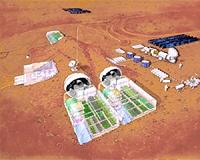 |
Paris (AFP) Aug 18, 2010 If a human ever sets foot on Mars, will it be a giant step or an exhausted shuffle? Long-term space flight so weakens fitness that an astronaut heading to the Red Planet may lose up to half the power in key muscles in the course of the mission, scientists have found. The loss -- equivalent to a crew member aged between 30 and 50 returning home with the muscles of an 80-year-old -- would add a major danger to a trip already laden with peril, they said. Researchers led by Robert Fitts, a professor of biology at Marquette University in Milwaukee, Wisconsin, took tiny samples of tissue from the calf muscles of nine US and Russian astronauts who spent around six months on the International Space Station (ISS). The biopsies, taken 45 days before launch and on the day of return, showed dramatically how muscles atrophy in zero gravity. The losses in fibre mass, force and power translated into a decline of more than 40 percent in the capacity for physical work, Fitts reported. Ironically, beefing up before the trip had no impact on muscle loss. In fact, crew members who began with the biggest muscles turned out to have the biggest decline in muscle fitness. Under one NASA scenario, a return trip to Mars using current rocket technology would take around three years, if a one-year stay on the planet is factored in. If so, the decline in the most-affected muscles such as the calf could approach 50 percent, said Fitts. Astronauts would tire faster doing even routine tasks, especially if they donned a space suit, and on returning to terrestrial gravity they could be so weak they might be unable to evacuate their spacecraft quickly in an emergency. The paper has been published online by The Journal of Physiology, and will appear in print next month. Muscle loss is a well-researched area in space medicine, but this is the first to include specific analysis of muscle cells on long-duration missions. Fitts said the results should not discourage humans from venturing farther into space. "Manned missions to Mars represent the next frontier, as the Western Hemisphere of our planet was 800 years ago," he said. "Without exploration, we will stagnate and fail to advance our understanding of the Universe." Even so, the findings clearly show the need to improve fitness regimes in space so that astronauts are exposed to high-resistance exercise and the kinds of motions they experience on Earth, he said. Muscle loss adds to the long list of hazards facing a trip to Mars. In addition to technical dangers, astronauts face cancer-causing damage to DNA from cosmic radiation, loss of bone density and mental stress from prolonged incarceration. In June, six men from Europe, Russia and China were locked away in a mock spaceship in a Moscow research institute for a year and a half to simulate a manned mission to Mars. The 520-day experiment comprises 250 days for the outward trip, 240 days for the return but only 30 days on the Martian surface.
Share This Article With Planet Earth
Related Links Mars News and Information at MarsDaily.com Lunar Dreams and more
 Greening The Moon And Mars
Greening The Moon And MarsMoffett Field CA (SPX) Jul 30, 2010 Future manned missions to the Moon or Mars could use plants as bio-harvesters to extract valuable elements from the alien soils, researchers say. Now they hope to launch new experiments to follow up on tests done with plants and lunar regolith during NASA's Apollo program that landed men on the Moon. Lunar regolith is a loose mixture of dust, soil, broken rock and other related mater ... read more |
|
| The content herein, unless otherwise known to be public domain, are Copyright 1995-2010 - SpaceDaily. AFP and UPI Wire Stories are copyright Agence France-Presse and United Press International. ESA Portal Reports are copyright European Space Agency. All NASA sourced material is public domain. Additional copyrights may apply in whole or part to other bona fide parties. Advertising does not imply endorsement,agreement or approval of any opinions, statements or information provided by SpaceDaily on any Web page published or hosted by SpaceDaily. Privacy Statement |